- ホーム
- > 洋書
- > 英文書
- > Literary Criticism
基本説明
The contributors to this volume demonstrate the significant role that fiction plays in early modern European culture, ranging from the Italian Renaissance to the French Revolution and examining the work of, among others, Montaigne, Corneille, Descartes, Hobbes, Locke, and Diderot.
Full Description
The uses of fiction in early modern Europe are far more varied than is often assumed by those who consider fiction to be synonymous with the novel. The contributors to this volume demonstrate the significant role that fiction plays in early modern European culture, not only in a variety of its literary genres, but also in its formation of philosophical ideas, political theories, and the law. The volume explores these uses of fiction in a series of interrelated case studies, ranging from the Italian Renaissance to the French Revolution and examining the work of, among others, Montaigne, Corneille, Descartes, Hobbes, Locke, and Diderot. It asks: Where does fiction live, and thrive? Under what conditions, and to what ends? It suggests that fiction is best understood not as a genre or a discipline but, instead, as a frontier: one that demarcates literary genres and disciplines of knowledge and which, crucially, allows for the circulation of ideas between them.
Contents
Introduction, Richard Scholar, Alexis Tadié; Chapter 1 Poetic Fiction and Natural Philosophy in Humanist Italy: Fracastoro's Use of Myth in Syphilis, Isabelle Pantin; Chapter 2 'Si Faut-il Voir Si Cette Belle Philosophie...': The Language of Fiction in Montaigne, Corneille, and Pascal, Wes Williams; Chapter 3 1 This chapter was translated by Liz Nash., Isabelle Moreau; Chapter 4 1 This chapter was translated by Sophie Lewis., Luc Foisneau; Chapter 5 The Making of the Modern Philosopher: Fictions of Philosophical Identity in Locke and Hume, Robert Mankin; Chapter 6 Philosophy, Ethics, and the Work of Fiction: Diderot's Answer to Molyneux's Question, Kate E. Tunstall; Chapter 7 1 This chapter was translated by Liz Nash., Anne Simonin;








